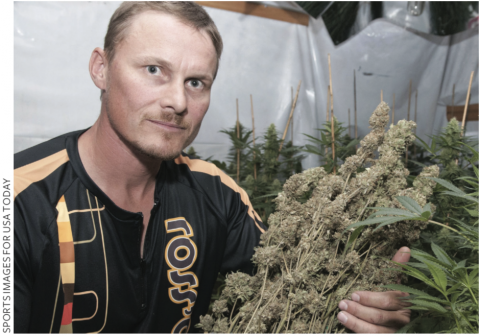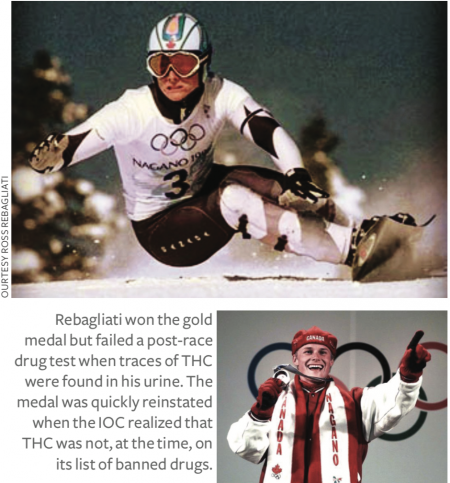
At the Nagano Olympics, he was stripped of snowboarding’s first gold medal. The next day, he had the medal back. Today, Ross Rebagliati is a successful marijuana entrepreneur in British Columbia. By Michel Beaudry
I wouldn’t change a thing,” says Canadian snowboard legend Ross Rebagliati. Owner of one of the most notorious gold medals in Winter Games history, the happily married father of three insists he long ago made peace with his past. “Sure, it hurt when it happened,” he admits. “It totally changed my life. But it also provided new opportunities for me and my family.”
Today the 46-year-old is a successful medical marijuana entrepreneur in British Columbia’s bucolic Okanagan Valley (use of marijuana for medicinal purposes has been legal in Canada since 2001, and the country plans to legalize the drug for recreational use in the summer of 2018). His dispensary is called Ross’ Gold. It’s a play on words, but also a reflection of where he wants to take his company. “My Olympic story makes up a big part of our storefront,” he explains. “Every day I bring my medal out and put it on display. I guess you could say I’m on a bit of a mission: I want our products, our brand, to set the gold standard in the business.”
And yet “it was a deeply traumatic experience,” concedes the former Whistler resident of his Olympic trials. “Especially since it didn’t need to happen. I’d never felt the full weight of negative media before. It was overwhelming.”
Anyone who followed the Winter Games that year can’t help but remember Ross’ story. It was February 1998, and snowboarding was poised to join the Olympic family in Nagano, Japan. The giant slalom had been scheduled for the first day and the field was stacked. “They’d watered down the course the night before,” remembers Ross. “And the hill was perfect—firm enough to set a good edge, but soft enough to hold your line.”
Race day dawned sunny and clear. But the first run did not go entirely to plan for the young Canadian. “I made two or three big mistakes that nearly stopped me in my tracks,” he confesses. “But to my surprise I was still among the top eight, barely a tenth [of a second] from first place.”
Throwing caution to the wind, Ross charged the second run like a man possessed. “By the time I reached the breakover and the steep part of the course, I was flying,” he says. “I remember barely being able to change my edge before hitting the next gate.”
His aggression paid off. In one of the most exciting giant slalom finishes in Olympic history, Rebagliati bagged the gold by the slimmest of margins. Says Ross: “I remember watching the Winter Games as a kid and daydreaming about standing on the top step of the podium…and it was happening for real. I had to pinch myself.”
His euphoria would be short-lived. During a routine drug test, a trace of THC, the active component in cannabis, was detected in Rebagliati’s post-race urine sample. It was a miniscule amount (less than 18 nanograms per millitre) but it was enough to convince the IOC brass to set the disqualification process in motion.
“I didn’t have a clue,” insists Ross. “We’d been warned by our coaches about the drug-testing protocol and I’d stayed away from weed for months.” Still, he hadn’t quite cut himself off from the culture. “All my Whistler friends indulged, but they respected my decision. I still hung out with them. I just didn’t toke with them.”
Picture the scene: “It’s the next morning and I’m hanging out with a few teammates in my room,” he begins. “Our race is done. Our Olympic contest is over. We’re all looking forward to becoming Games tourists now.”
Suddenly two coaches appear at Rebagliati’s door. “Sit down, Ross,” says one.
“I knew immediately it was about my drug test,” he says. “I was sure it had something to do with weed.”
The next few hours passed in a blur. First he was driven from the relative calm of Shiga Kogen Resort to IOC headquarters in Nagano and the already-alerted press. It was the first big Olympic story and the media was in a feeding frenzy. “The whole Canadian Mission Team staff was there,” he remembers. “They formed a circle around me and tried to get me inside. People were screaming questions at me. Accusing me of all sorts of things. I felt like I had betrayed my country. I was in shock, emotional, ashamed.”
But worse was yet to come. While his case was being argued in the IOC court of arbitration, Ross was arrested by the Japanese police and charged with importing an illegal substance. “It was surreal,” says Ross. As he sat in his Nagano cell, the devastated snowboarder played back the events of the last 24 hours. How could this have happened?
And then everything changed. In what can only be described as a scene from the theatre of the absurd, it was revealed during another round of court hearings that THC wasn’t on the IOC’s banned list after all. “So the lawyers told me: ‘You’re good to go’,” says Ross. “The next day I boarded a flight to LA for an appearance on the Tonight Show with Jay Leno. I mean, talk about a turnaround. Still, I was really angry. I’d spent time in jail, me, the gold medal winner. And all for nothing.”
After the Nagano Games, the IOC did place THC on the banned drug list. The legal limit was set at 30ng/ml. The level in Ross’ urine in the 1998 sample was half that amount.
Meanwhile, the fallout from his wrongful disqualification continued to haunt his life.
“My homecoming was marked by a big party in the Whistler town center,” he says. “The place was packed. I should have been on cloud nine.” And yet the 26-year-old couldn’t fully enjoy the celebration. “I was still feeling guilty…like my Olympic performance was tarnished somehow.”
 That nagging sense of unease increasingly shut him off from his friends and family. Ross says he didn’t leave his Whistler condo for weeks. “I was afraid to answer the door even for the pizza delivery guy,” he remembers. “The media had branded me as the ‘stoner snowboarder who won the gold.’ But that wasn’t me.”
That nagging sense of unease increasingly shut him off from his friends and family. Ross says he didn’t leave his Whistler condo for weeks. “I was afraid to answer the door even for the pizza delivery guy,” he remembers. “The media had branded me as the ‘stoner snowboarder who won the gold.’ But that wasn’t me.”
Rebagliati eventually overcame his demons and got back on his snowboard…only to find that his status had changed. “My legacy was badly damaged by the Internet,” he says. “I lost sponsors, lost supporters. After 9-11, I was even put on the U.S. no-fly list and told I wasn’t welcome in America anymore. It had major consequences. Suddenly I couldn’t compete at events like the X-Games. My snowboarding career was done.”
So Ross moved on with his life. He’d made some good moves early in Whistler’s booming real estate market and was now reaping the financial benefits from those investments. He got married, had a child, and in 2006 moved east to Kelowna in BC’s Okanagan Valley. It looked like the still-boyish champion had turned things around for himself.
But there were more bumps in the road. His marriage broke apart. Some business deals soured. Things just weren’t working out. So he returned to Whistler in 2010 and started questioning himself all over again. What could he do, he wondered, to finally bring closure to his still-troubled Olympic saga? And then it came to him.
Snowboarding’s first Olympic gold medalist launched his medical marijuana dispensary, Ross’ Gold, with partner Patrick Smyth in January 2013. The media picked up on it immediately. Over the next few months, he and his company were profiled in USA Today, the Huffington Post, the Canadian Broadcasting Corporation (CBC) and the Toronto Star. By 2015, his branded glassware and products could be found in nearly a hundred stores across Canada. And when the Liberals promised to legalize pot during that year’s federal election, Ross was quick to jump on their bandwagon.
“We opened our first storefront in Kelowna in December 2016,” he says. “And now we’re looking to acquire, or pair up with, a local vineyard.”
“I probably wouldn’t be in the marijuana business today if I hadn’t lived the experience I did in Nagano,” he adds. “But I certainly wasn’t forced down this road.”
Married again, back in Kelowna and now the father of three children—Ryan, 8, Rosie, 5, and Rocco, 2—Ross feels like he’s finally found his place. “I want to feel good about being an Olympic champion. And with Ross’ Gold I can do that. I see it on my customers’ faces every day: my story does make a difference to their lives. And that makes me truly happy. As I said before, I wouldn’t change a thing.”
